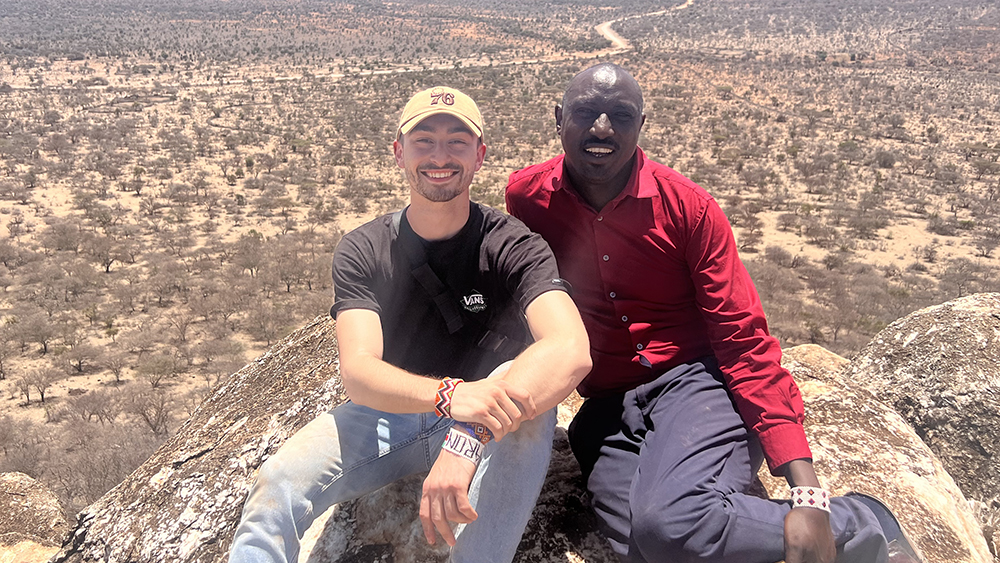
Aaron Lemma with Water is Life Kenya’s Kenyan Co-Founder, Maasai elder Joseph Larasha, in Kajiado County in February.
Clean water, a daily staple that so many take for granted, is a precious commodity in many parts of the world. Aaron Lemma ’22 has witnessed this dire need in his travels to Kenya and is working to rectify the clean water shortage for thousands of Kenyans.
Lemma is the outreach and operations manager for a non-profit called Water is Life Kenya (WILK). The organization is based in Newark, Delaware, but its focus is on the people of Kenya, a country in East Africa with a population of more than 47.6 million.
WILK was established by Joyce Tannian in 2007. As a resident of New York City during September 11, Tannian was inspired by the immense love and support her city received after the terrorist attacks. She was inspired to volunteer, leading her to southern Kenya in 2005. On her first trip to the country, she saw the widespread effects of poverty on education – especially for females.
While in Kenya, Tannian experienced the country’s drought firsthand and heard the phrase “water is life” from her Kenyan friends. “It was not until I was confronted by water shortage that I fully understood their meaning. Water makes grass grow, nourishes livestock, and sustains life. Without water, there is no hope, no life,” she said.
In the organization’s 16 years of operations, 27 water projects have been completed, translating into 80,000 having access to clean water. These projects include drilling wells to provide clean water for drinking, cooking, washing, and livestock. The cost per well ranges from $80,000 to $100,000.
“Primarily, we do deep borehole wells, which go anywhere from 200 to 300 meters down. We realized that in order to keep these wells functioning, we had to make sure people had incomes. So, we started a livestock business for the Maasai people (the indigenous group they serve). We teach them how to manage their livestock better, which has increased incomes around the wells,” Lemma explained.
Lemma has worked for the organization for the past eight months, cultivating donors and enhancing fundraising opportunities. He also directs communications for WILK, including a weekly blog.
Lemma found his way to Neumann University through the Alliance for Catholic Education at St. Joseph’s University (ACESJU). He is a 2020 graduate of St. Joe’s with a degree in Interdisciplinary Health Services. The ACESJU program requires students to work for two years in elementary and secondary schools in the Archdiocese of Philadelphia and Diocese of Camden. In conjunction with these work experiences, ACESJU students earn their master’s degree at St. Joe’s or Neumann. Lemma earned a master’s in Business and Organizational Leadership at NU.
While teaching Biology at Neumann Goretti High School in Philadelphia, Lemma became intrigued with the natural world and realized that he wanted to be working to combat climate change.
“I told our program director Father Dan Joyce, the liaison between Neumann and St. Joe’s, that I wanted to leave education and work on the front lines of climate change. That’s where my heart was calling me,” Lemma said. “This job description came across his desk one day, and he sent it to me.”
Not only is clean water vital to healthy living and survival for Kenyans, but Lemma explains it also has educational implications.
According to Lemma, girls in Kenya cannot attend schools because they spend six to eight hours a day carrying water from community lakes and rivers to their homes. These sources provide water, but it would hardly be considered clean by our standards.
Last February, Lemma traveled to Kenya and saw the good that WILK is doing in that country.
“It’s impressive to be able to do the kind of work that we do from Newark, Delaware, because all of our projects are in Southern Kenya,” he said. “My job is to tell that story and build relationships so we can continue doing this work because there’s a lot of need.”
Lemma considers himself blessed to be able to combine his passion for the environment and helping others. One year after he expressed this desire to Fr. Joyce, he found himself in Kenya working for WILK.
“Sometimes doors open, and I’m fortunate that I recognized that. This is emotionally challenging work, but it’s such a privilege, too,” he said. “This is what I wanted to be doing.”
 CHALLENGE
CHALLENGE





